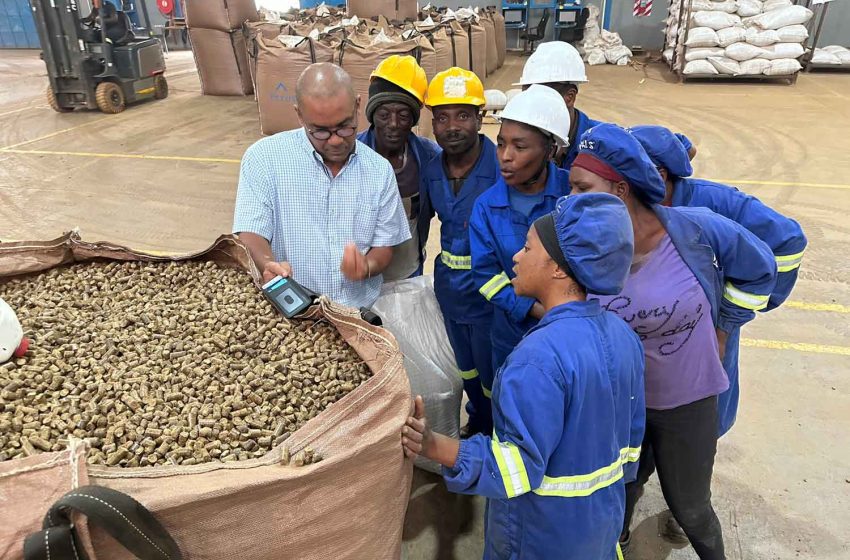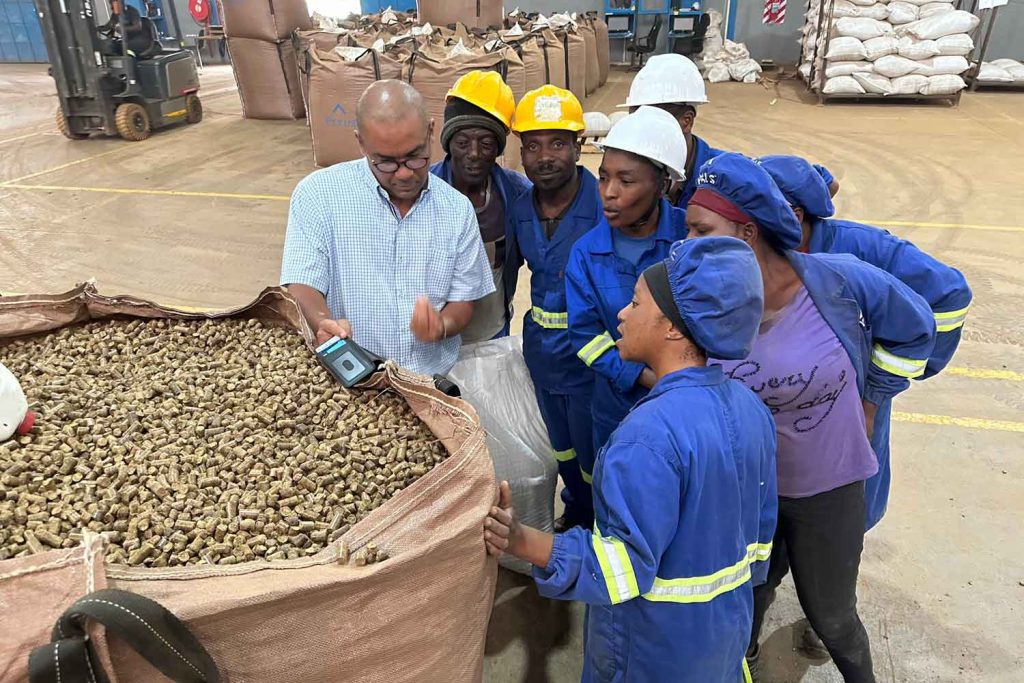A Gamble on Goobers
- Also in TR Print Edition Sustainability
- June 1, 2023
- 0
- 7 minutes read


Pyxus has great expectations of its Malawi groundnut business
Like many of their customers, tobacco merchants in Malawi have been exploring supplemental lines of business—not only to ensure their future as cigarette consumption stagnates but also to help their contracted farmers develop supplemental sources of income.
Pyxus Agriculture Malawi’s (PAM) contracted tobacco farmers often cultivate nontobacco crops, including groundnuts, maize and sunflowers. Measured by weight, its growers already produce four times more food than tobacco. As part of its efforts to improve farmer livelihoods and the communities in which they live, Pyxus has been working to find markets for some of these crops.
The company has high expectations, especially for groundnuts, which are nutritious sources of protein, vitamins and dietary fiber. Among other health benefits, groundnuts are credited with preventing heart diseases, lowering bad cholesterol and improving fertility. Common products made from groundnuts include cooking oil, herbal supplements, butter and snack items. Groundnuts are also used as a source for animal fodder. There are three categories of groundnuts: the Hausa groundnut, the Bambara groundnut and the peanut.
Driven by consumers’ growing appetite for protein-rich and plant-based foods, global demand for groundnuts is increasing by 4 percent per year. Market Research Future projects the value of global peanut sales alone to reach $107.4 billion by 2030. Malawi has grown groundnuts for decades. “In the 1980s, Malawi used to be a big exporter to Europe,” says PAM Managing Director Ronald Ngwira. Currently, however, Africa is a net importer of groundnuts; global supply is dominated by Argentina, India and the United States. Malawi produces 447,421 metric tons of groundnuts—less than 1 percent of global cultivation.
A Good Match for Malawi
In addition to enjoying strong global demand, groundnuts are suited to Malawi’s conditions. Due to the country’s landlocked location, agricultural exports must travel long distances to ports in either South Africa or Mozambique. As a semi-perishable product, groundnuts are able to tolerate such journeys without requiring expensive cold storage.
What’s more, groundnut plants release nitrogen as they decompose, improving soil fertility and allowing farmers to reduce their fertilizer bill. Soil health has been a major concern in Malawi, where farmers struggle with high levels of acidity and insufficient levels of organic matter due in part to deforestation and less-than-optimal agricultural practices.
Another benefit: Leftover shells from Pyxus groundnut operations can be converted into fuel pellets and green charcoal, reducing the need to cut trees for firewood and potentially saving thousands of hectares of forest. This is a big deal in Malawi, where few people have access to electricity and the majority of the country’s rapidly growing population burns wood as fuel for cooking and energy. Wood is also used by farmers to build barns and cure tobacco. Industry typically relies on coal to fuel its activities. According to Ngwira, the use of groundnut shell-based fuel has already allowed Pyxus to reduce AOTM’s factory reliance on coal by 40 percent.
One challenge that has been holding back Malawi groundnut production is the quality of its plant varieties, which has constrained quality and productivity. To unlock the potential of groundnuts for Malawi, PAM has been researching better cultivars. Over the past few years, the company examined 1,000 strains from around the world. Looking for varieties that are high in protein, climate-change resilient and resistant to disease, PAM selected four types and presented them to the ministry of agriculture for approval. The company then invested in irrigation, mechanization and multiplication of the improved varieties to boost farmers’ yields and incomes.
Boosting Volumes and Quality
Tapping into its large network of tobacco field technicians, Pyxus also started offering extension services to groundnut farmers. “We have more than 150 qualified extension officers training farmers on a daily basis to assist farmers achieve better yields and quality while also ensuring track-and-trace capabilities to export into international markets,” says Ngwira. At 1 metric ton per hectare, average groundnut yields have traditionally been low in Malawi. With better cultivars, inputs and agricultural practices, however, it should be possible to increase those yields to 3 metric tons per hectare, according to PAM. Ngwira says the company will follow the same journey it took when implementing the integrated production system in tobacco, where years of farmer training resulted in substantially improved productivity and loan recovery rates.
PAM’s investments in groundnuts are paying off already. In 2021, Malawi’s government set the minimum selling price of groundnuts at MKW330 ($0.32) per kilogram. Owing to the quality produced by its contracted farmers, Pyxus was able to offer a minimum price of MKW440 per kilogram, according to Ngwira.
PAM is also tackling the problem of aflatoxins, poisonous carcinogens produced by certain molds that can impact agricultural crops. Historically, Malawi groundnuts have suffered from comparatively high levels of aflatoxins, but with better agricultural practices, such as quick drying to prevent the formation of fungi, it is possible to reduce contamination to below the tolerances prescribed by export markets.
In March 2022, PAM inaugurated a $3 million processing factory in Lilongwe’s Kanengo, where it not only cleans, shells and sorts the groundnuts but also turns the leftover shells into fuel pellets. Built in a disused tobacco warehouse, the facility employs more than 100 people and has the capacity to process 50,000 tons of groundnuts per annum. It is the largest groundnut shelling plant on the African continent outside of South Africa.
Addressing Malawi President Lazarus Chakwera and other dignitaries attending the opening ceremony, Ngwira noted that factory was key to unlocking Malawi’s potential for agricultural industrialization—which is in line with the government’s commitment to promote exports through value addition for agricultural crops.
Ngwira is excited about the prospects for Malawi groundnuts. In addition to growing demand from major markets such as China and India, there is also a huge appetite for the product regionally. “Currently, most Malawi groundnuts are exported to the Lake Victoria region,” he says. Already home to more than half a billion people, the area’s population is projected to grow significantly. “Malawi can help supply the protein to feed those people,” says Ngwira.
To cater to the anticipated demand, PAM aims to rapidly expand its contacted farmer base from about 7,000 smallholders at the time of the factory opening to about 30,000 in the future. In the process, it will not only create additional sources of incomes for its contracted farmers but also provide Malawi with a welcome supplement to tobacco as a source of much-needed foreign exchange.—T.T.

